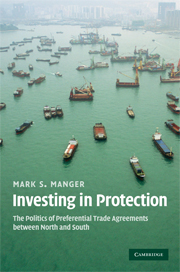Book contents
- Frontmatter
- Contents
- List of figures
- List of tables
- Acknowledgments
- List of abbreviations
- Japanese names and conventions
- 1 Introduction
- 2 Framework for analysis
- 3 NAFTA – the original sin?
- 4 Iberian ties: the EU–Mexico free trade agreement
- 5 The odd couple: the Japan–Mexico free trade agreement
- 6 The far side of the world: preferential trade agreements with Chile
- 7 Japan's NAFTA route: preferential trade agreements with Malaysia and Thailand
- 8 Conclusions and implications
- References
- Index
2 - Framework for analysis
Published online by Cambridge University Press: 08 January 2010
- Frontmatter
- Contents
- List of figures
- List of tables
- Acknowledgments
- List of abbreviations
- Japanese names and conventions
- 1 Introduction
- 2 Framework for analysis
- 3 NAFTA – the original sin?
- 4 Iberian ties: the EU–Mexico free trade agreement
- 5 The odd couple: the Japan–Mexico free trade agreement
- 6 The far side of the world: preferential trade agreements with Chile
- 7 Japan's NAFTA route: preferential trade agreements with Malaysia and Thailand
- 8 Conclusions and implications
- References
- Index
Summary
Governments liberalize international trade for a variety of economic reasons. Often, they respond to the demands of export-oriented industries (Milner 1988). At other times, they seek trade agreements because they hold causal beliefs that free trade increases the welfare of societies (Simmons and Elkins 2004). But these factors cannot explain why states would prefer preferential over multilateral or unilateral liberalization. Unilateral market-opening, although economically desirable, is rare. Without a foreign partner to offer reciprocal liberalization, governments frequently have difficulties in overcoming the resistance of domestic groups that would compete with imports. Multilateral liberalization not only embodies the sovereign equality of nation-states and “diffuse reciprocity” (Ruggie 1993), but can also be shown to increase global welfare more than preferential trade agreements under a variety of conditions (Krishna 2005). Yet the choice between different venues for liberalization is not well explored.
The general trend towards PTAs has no doubt been encouraged by the ever-longer multilateral negotiating rounds. With more than 150 members, the WTO is an unwieldy organization (Mansfield and Reinhardt 2003; McLaren 2002). Since most international commerce still takes place between the “Quad,” consisting of Canada, the United States, the EU, and Japan, lately plus China, greater numbers do not automatically imply more trade. Faced with rising negotiating costs but diminishing returns to multilateral liberalization, countries may simply look for alternatives.
But a general propensity to sign more PTAs does not tell us much about the choice of partners.
- Type
- Chapter
- Information
- Investing in ProtectionThe Politics of Preferential Trade Agreements between North and South, pp. 27 - 63Publisher: Cambridge University PressPrint publication year: 2009

